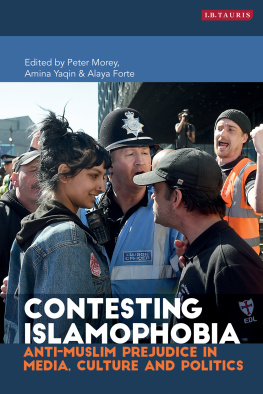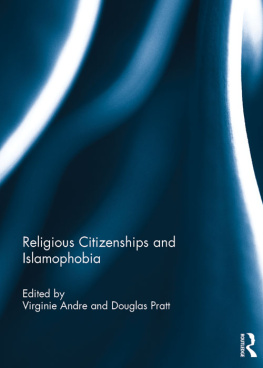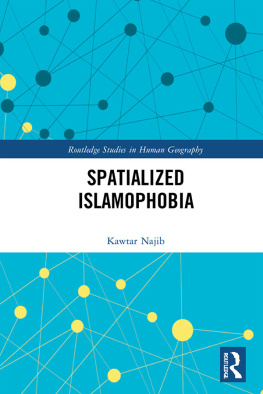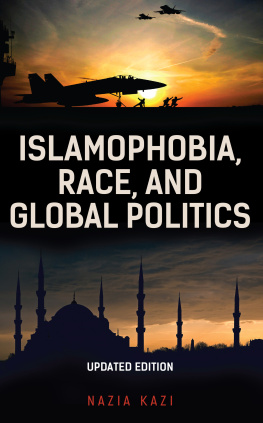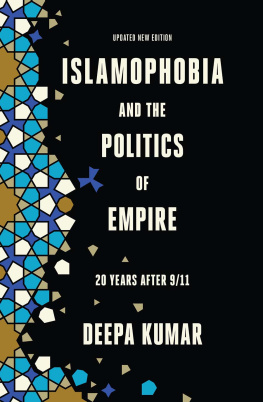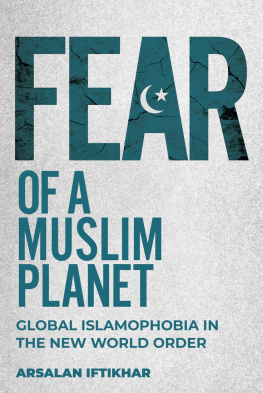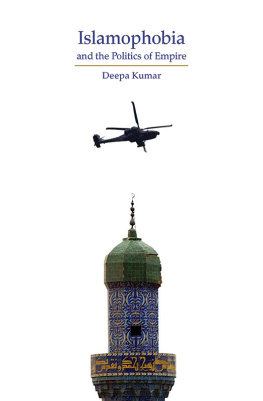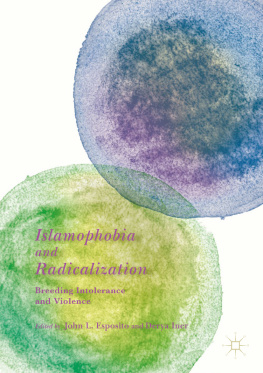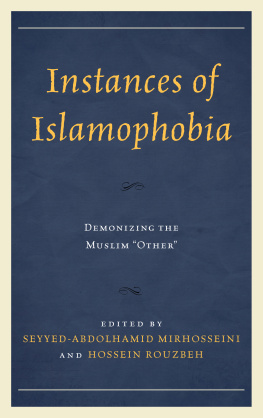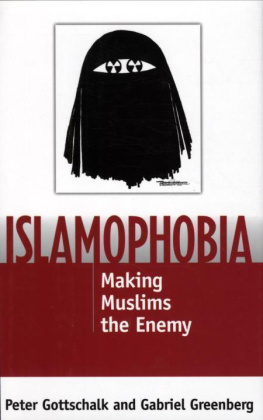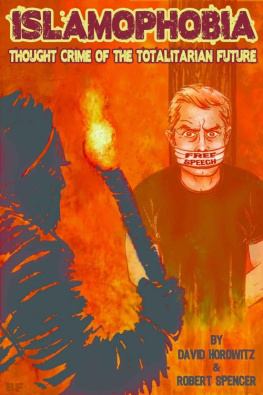Contesting Islamophobia
Contesting Islamophobia
Anti-Muslim Prejudice in Media, Culture and Politics
Edited by
Peter Morey, Amina Yaqin and Alaya Forte

Contents
The seeds of this book were planted at the Beyond Islamophobia conference, held at SOAS, University of London, in 2014. Academics, activists and artists from around the world gathered to share experiences of Islamophobia and the fruits of their research into this global form of prejudice, and to consider the means by which anti-Muslim prejudice might be challenged. The conference was part of the RCUK-funded Muslims, Trust and Cultural Dialogue project, and we would first like to give thanks to the combined UK funding councils for their generous support during that project. Thereafter, this volume took its present shape owing to the dedication of its contributors who have risen to the challenge of reflecting on the ways in which Islamophobia might be contested in the various walks of life where it is most prevalent. Our gratitude is owed to those who have written for us, allowed their discussions to be transcribed and permitted us to interview them. We hope the resulting volume captures something of the dynamism with which individuals and groups are banding together to better understand and fight this form of prejudice.
Intellectually, we are indebted to those who have charted this area before us, no one more tellingly than the late Edward Said. His work in describing how Islam is covered in the sense of both being heavily reported by Western media forms and, in the process, being smothered by limited, stereotypical framing provides the foundation for all the work we have done in this field. In his attempts to expose the one-sidedness of Western views of Islam and especially Arabs Said was followed by the redoubtable and much-missed Jack Shaheen, whose work on Arab stereotypes in cinema remains the benchmark for all accounts of media representations of Muslims. Their legacy can be seen in the present volumes concern to bring together perspectives from disciplines such as history, sociology, literature, art and media studies. This is important since it is by means of a broad array of discourses, touching on all walks of life, that our views of the world and its inhabitants are shaped for good or ill.
We are extremely fortunate to have had the support of John L. Esposito, the leading figure in the understanding of Muslims and anti-Muslim prejudice in the world today. The foreword he has provided is only one of the ways he has helped us since his attendance at that initial conference. As such he is to be heartily thanked. Several others represented in this volume have, likewise, been generous with their time and advice, so that any shortcomings the reader finds here must be held against the editors, rather than our contributors who form a roster of some of the leading figures in their respective fields.
We would like to also thank our respective institutions the University of Birmingham and SOAS, University of London. Peter Morey would also like to acknowledge the support he received from the University of East London, where he spent many years and where he was employed while running the Muslims, Trust and Cultural Dialogue project. We wish to acknowledge the many colleagues and students who have supported and believed in this project over the years and who have contributed to its intellectual nurturing. We would particularly like to thank Sarah Pett and Kai Easton for their invaluable support and friendship.
A huge debt of gratitude is owed to Professor Muhammad Abdel Haleem and the Centre for Islamic Studies at SOAS for their help in covering the book production costs. Thanks are also due to Sophie Rudland and her colleagues at I. B. Tauris for immediately seeing the publishing potential of our initial idea and for their patience and guidance as we slowly pulled it together. We must also save a word of praise and gratitude for Rachel Goodyear, whose meticulous and proactive copyediting allowed us to smarten up a rather rough first draft and make it publishable.
The Spread of False Information. Image courtesy of Equaliteach. |
Facts versus Research. Image courtesy of Equaliteach. |
Muslim Flip-chart. Image courtesy of Equaliteach. |
Infinite Justice , Aisha Khalid (2001). Image courtesy of Green Cardamom Vipul Sangoi. |
Infinite Justice (detail), Aisha Khalid (2001). Image courtesy of Green Cardamom Vipul Sangoi. |
Please Do Not Touch, Stay Out and Enjoy the Show , Hamra Abbas (2004). Image courtesy of Green Cardamom Vipul Sangoi. |
Please Do Not Touch, Stay Out and Enjoy the Show (detail), Hamra Abbas (2004). Image courtesy of Green Cardamom Vipul Sangoi. |
Politically Incorrect , Imran Qureshi (2006). Image courtesy of Green Cardamom Vipul Sangoi. |
Calling all Bigotry Busters. |
Stamp Out Racism. |
Nath Aldalalaa is Associate Professor of International Relations and Cultural Studies at Shandong University, China. He is a specialist in international relations of the Middle East and American foreign policy. He has a special interest in post-9/11 writings, on which he has published a number of articles, specifically those that focus on security and global terrorism.
Dibyesh Anand is the head of the Department of Politics and International Relations at the University of Westminster in London. He is the author of the books Geopolitical Exotica: Tibet in Western Imagination (2007) and Hindu Nationalism in India and the Politics of Fear (2011) and has published on varied topics including Tibet, the ChinaIndia border dispute, Hindutva and Islamophobia, identity politics in Tanzania and nationalism.
MadelineClements is Research Lecturer in English Studies at Teesside University. She is the author of Writing Islam from a South Asian Muslim Perspective (2015). She has published and reviewed widely, particularly in the area of post-colonial literary fiction. Her current research interest is in the politics of South Asian Muslim art and literature. Her articles and reviews have appeared in a range of publications, including the Times Literary Supplement .
Myriam Francois is a writer, broadcaster and academic with a focus on current affairs. Her writing has been featured in the Guardian , CNN , the New Arab , Jadaliyya and ABC , among others. She is the presenter of two BBC One documentaries, The Muslim Pound (2016) and A Deadly Warning: Srebrenica Revisited (2015).
Roberta Garrett is Senior Lecturer in Literature at the University of East London. She has published widely on gender representation in film and literature, being the author of Postmodern Chick-Flicks: The Return of the Womans Film (2007) as well as numerous articles and book chapters. She co-edited (with Tracey Jensen and Angela Voela) We Need to Talk about Family: Essays on Neoliberalism, The Family and Popular Culture (2016) and is currently completing a book entitled Writing the Modern Family: Neoliberalism and Representation of Parenting in Contemporary Novels and Memoirs.
Peter Gottschalk is Professor of Religion at Wesleyan University. His research focuses on the dynamics of cultural interpretation and conflict in the context of Islam, Hinduism and the West. He is the author of Beyond Hindu and Muslim: Multiple Identity in Narratives from Village India (2000); collaborated with Mathew N. Schmalz in editing Engaging South Asian Religions: Boundaries, Appropriations and Resistance (2011) and in creating an interactive website called A Virtual Village (2001); and co-wrote, with Gabriel Greenberg, Islamophobia: Making Muslims the Enemy (2007).

